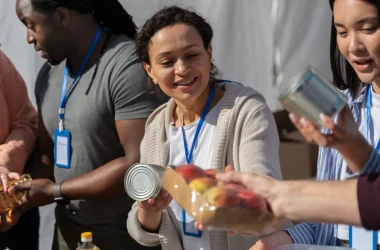Franchises have become very much a part of the daily life of most New Zealanders, whether we know it or not. We buy Lotto tickets, groceries and even houses from franchised companies. We have our lawns mown, our carpets cleaned, and our cars serviced by franchises. At work, the computers may be supported by a franchised team, or the office cleaned by one. We eat out at franchises – not just fast food, but Bakers Delight, Katsubi, or Columbus Coffee. And at the end of the day, after we have brushed our teeth with toothpaste bought from a franchised supermarket, we climb into a franchise-bought bed.
But what is franchising? How does it work? Isbuying a franchise a safe way to go into business for yourself, or is it just a pyramid selling under a different name? Can you really make money as a franchisee?
In this beginner’s guide, we’ll answer some of those questions to help those who are considering buying a franchised business for the first time to understand how franchising works.
Franchising Is All Around Us
You might not realise it, but franchises are part of everyday life in New Zealand. We buy our groceries from franchised supermarkets, grab coffee from franchised cafés, and even have our homes cleaned by franchised services.
Think about it:
- You may have bought a Lotto ticket from a franchised store.
- You might get your car serviced at a franchised garage.
- The café you stop at on your way to work might be part of a franchise network like Columbus Coffee or Muffin Break.
Franchises are everywhere — from fast food and retail to home services and real estate. In fact, you’ve probably interacted with several franchises just today without even thinking about it.
What Exactly Is Franchising?
Franchising is a business model where one business owner (the franchisor) creates a proven system for selling products or services and then allows others (franchisees) to use that system.
The franchisee operates under the franchisor’s brand name, using their processes, training, and support — but they own their own business. The arrangement usually lasts for a set period (often 5–20 years).
In return, the franchisee:
- Pays an initial franchise fee to get started.
- Pays ongoing fees or royalties, usually either a fixed monthly amount, a percentage of sales, or a markup on products supplied.
The franchisor earns income from these fees, and in return, they:
- Provide training, tools, and systems.
- Help with marketing and advertising.
- Support the franchisee in running the business profitably.
This setup is called business format franchising — and it’s been one of the most effective ways to grow businesses worldwide for more than 70 years.
How It Works: The McDonald’s Example
When you hear “franchise,” one of the first names that might come to mind is McDonald’s. With over 40,000 restaurants in more than 100 countries, they’re one of the most famous examples of franchising.
Here’s how it works in practice:
When you go into your local McDonald’s, you’re actually visiting a locally owned business — not a store owned directly by McDonald’s headquarters. The person running it (the franchisee) has bought the rights to operate a McDonald’s in that location.
They:
- Applied to McDonald’s and went through a selection process.
- Completed in-depth training (covering everything from cooking burgers to managing staff and finances).
- Paid the initial franchise fee.
- Funded the full setup of the restaurant.
In return, they:
- Get to use the McDonald’s brand and systems.
- Benefit from national advertising campaigns.
- Receive ongoing support from McDonald’s field managers.
The franchisee keeps the profit from sales, but they also pay ongoing royalties and advertising contributions. This arrangement means they’re in business for themselves but not by themselves.
What Are You Paying For?
When buying a franchise, your investment usually covers:
- The Franchise Fee
This is your ticket to use the franchisor’s name, branding, and systems.
- Setup Costs
You’ll pay for the equipment, fit-out, stock, and any other setup expenses.
- Ongoing Fees (Royalties)
Paid regularly, these help cover brand development, research, new product creation, and ongoing support.
- Marketing Contributions
Many franchises pool marketing funds from all franchisees to run national or regional advertising campaigns.
These payments aren’t just expenses — they’re investments into a system designed to give you a better chance at success.
Different Types of Franchises
Franchising isn’t just for fast food. In New Zealand, you’ll find franchises in:
- Home & building services: Kitchen Studio, Landmark Homes.
- Automotive services: Pit Stop, Touch Up Guys.
- Cleaning services: CrestClean, Paramount, Jani-King.
- Retail: Stirling Sports, BedsRus.
The key is the operating system — whether you’re mowing lawns or running a café, the system must give you advantages over running an independent business.
Why Franchising Works
Running a small business on your own means you have to handle everything: marketing, quoting jobs, maintaining equipment, doing the work, and handling paperwork.
In a franchise:
- Calls, quoting, and scheduling might be handled centrally.
- Equipment is bought in bulk at discounted prices.
- Marketing is professionally managed and funded by the network.
- Training ensures you work efficiently from day one.
This saves time, increases efficiency, and helps you focus on the income-generating parts of the job.
Master Franchising
In some cases, a franchisor sells the rights to a master franchisee in a certain region or country. That person is responsible for:
- Recruiting local franchisees.
- Providing training and support.
- Running regional marketing campaigns.
For example, The Coffee Club’s master franchisees in New Zealand helped the brand grow to over 65 outlets by offering local expertise and on-the-ground support.
Franchising in New Zealand
Franchising has been part of our business landscape since the 1960s, but it really took off in the 1990s. Today:
- There are over 540 franchise brands.
- Around 30,000 franchised units operate nationwide.
- They employ about 115,000 people.
- The sector turns over $47.2 billion annually — about 11% of our GDP.
We have more franchises per capita than any other country in the world.
Is It Safe?
Franchising isn’t risk-free — no business is. Some franchisees do fail. But compared to starting an independent business from scratch, a well-run franchise system often gives you a much higher chance of success.
To reduce risk:
- Choose a franchise that fits your skills, interests, and budget.
- Research the brand’s history and track record.
- Talk to existing franchisees about their experiences.
- Get advice from a lawyer and accountant experienced in franchising.
Final Thoughts
Franchising has worked for thousands of Kiwis from all walks of life — from new migrants to seasoned businesspeople. It offers the independence of being your own boss with the backing of a proven system.
If you choose carefully, prepare well, and work hard, franchising could be your pathway to owning a profitable and sustainable business.

















